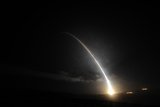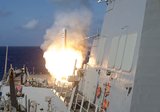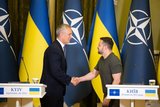Sweden puts out emergency war pamphlet amid Russia fears
The Swedish government on 21 May presented an emergency pamphlet to prepare millions of citizens in the event of a war, natural disaster or cyber attack amid soaring tensions between Russia and the Western allies.
Entitled ‘If Crisis or War Comes’, the brochure is published in 13 languages at the request of the government and gives advice on how to take shelter, what foods to store and what information to trust. It will be sent to 4.8 million Swedes between 28 May and 3 June.
The 20-page document outlines with simple illustrations the threats which the Nordic nation is facing such as military conflict, natural disasters, cyber and terror attacks.
Dan Eliasson, head of the Swedish Civil Contingencies Agency, which prepared the booklet, said: ‘Even if Sweden is safer than many other countries...threats do exist.
‘It's important that everyone has knowledge of what can threaten us so we can prepare in case something serious occurs.’
Christina Andersson, the brochure's project manager, told AFP: ‘Sweden will be affected if there is a military conflict close to us. It might affect our import of goods like food and so on...even though the military conflict is not in Sweden itself we can get affected.’
The last time such a brochure was printed was in 1961 during the Cold War.
While the latest booklet does not point to any country, its release comes amid fears of an open conflict between NATO and Russia over Moscow's military activities along its borders.
Sweden, which is not a NATO member, does not share a border with Russia, but the two nations are connected across the Baltic Sea, where Moscow has a naval base in Baltiysk, located in the Kaliningrad region east of the Stockholm coastline.
The sight of an unidentified submarine in the Stockholm archipelago in the autumn of 2014 heightened Russian worries and was followed by several violations of Swedish airspace by Russian aircraft.
In December 2017, a defence commission representing all parties in the Swedish parliament published a report entitled ‘Resilience’ which presented military proposals between 2021 and 2025.
Bjorn von Sydow, the commission chairman and a former Social Democrats defence minister, said at the time: ‘The military situation has deteriorated in Europe in recent years and Russian military capabilities are increasing and will continue to increase.’
The commission recommended investing $470.7 million per year to modernise the military and civilian defence systems, allowing people to store water and food for a week so the nation could stand a blockade for three months.
Sweden is not a member of NATO, but joined its Partnership for Peace launched in 1994 to develop military cooperation between the allies and non-member countries.
The nation has not experienced an armed conflict on its territory for more than two centuries, and to some Swedes, the risk of that happening is unlikely.
‘I don't think the risk is higher today than it was yesterday,’ said Svante Rosing, a retired lawyer in his mid-70s who said he remembers the Cold War pamphlet looking ‘quite threatening’.
Sweden slashed military spending at the end of the Cold War, but Moscow's annexation of Crimea changed the situation.
Stockholm announced in March 2017 that it would reintroduce compulsory military service as early as summer 2018, seven years after it was abolished.
The nation also resumed military activities on Gotland, an island in the Baltic Sea.
On 21 May, Swedish Prime Minister Stefan Lofven and Sweden's King Carl XVI Gustaf announced the first creation of a Swedish regiment since World War II, located on the island in ‘a clear signal’ of Stockholm's priorities.
Lofven was quoted as saying by the daily Aftonbladet: ‘We're showing that we have military muscles.’
More from Defence Notes
-
![US lawmakers warn that “more military spending is absolutely necessary” to ensure Pentagon’s readiness]()
US lawmakers warn that “more military spending is absolutely necessary” to ensure Pentagon’s readiness
The US Congress has raised concerns about how inflation rates and cuts in main acquisition programmes could affect the US military.
-
![US FY2024 funding package passes as China closes military capability gap]()
US FY2024 funding package passes as China closes military capability gap
The Pentagon has been operating under temporary funding since October 2023, which has impacted its main acquisition and development programmes, increasing the capability gap between the US and China.
-
![NATO outlines future challenges as Ukrainian funding from US stalls]()
NATO outlines future challenges as Ukrainian funding from US stalls
In 2023, defence spending increased by an unprecedented 11% across European NATO countries and Canada. Since 2014, the group has spent an additional US$600 billion on defence.
-
![US Pentagon to reduce investments in main acquisition programmes over FY2025]()
US Pentagon to reduce investments in main acquisition programmes over FY2025
The DoD requested nearly US$850 billion to fund operations over the next fiscal year. Despite the amount being 1% higher than the FY2024 budget request, it has not covered the 3% inflation rate, which could impact the DoD’s main programmes in the medium and long term.
-
![Haiti crisis forces Caribbean militaries to prepare for intervention]()
Haiti crisis forces Caribbean militaries to prepare for intervention
As gangs gain control of Port-au-Prince, Haiti’s Caribbean neighbours have been preparing to intervene in the failed state, with the US and other partners waiting in the wings with equipment and financial support.






















